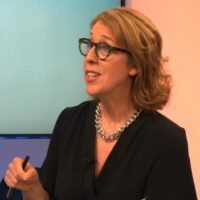
Speaking at the British Mortgage and Protection Senate last week, Professor Trevor Williams (pictured), author, lecturer and ex-chief economist at Lloyds, said: “Next year, the bank might even panic and just dramatically cut bank rate because we will continue to skirt recession or go into one. Nothing else is possible given our productivity and growth rate right now.”
Williams said just 40 per cent of the 13 base rate rises had impacted the flatlining economy so far, with another 60 per cent yet to take effect. “I think we’re overdoing it for no good reason,” he added.
The base rate rises are just ‘making people poorer’, he said, because there is little patience to just let the medicine of higher rates work, and the retreat in commodity prices take effect.
Williams said money oversupply had contributed to the peak in inflation of 11.1 per cent last October. With the Bank of England currently unwinding quantitative easing by selling £6.7bn a month of its £800bn plus bond holding, money supply is shrinking and hence operating in the opposite direction and lowering inflation, but with a lag.
“So the inflation rate will come down for three reasons: energy costs are lower, money supply is contracting, and they’re raising interest rates. We have no growth in the economy, so inflation is not demand-led. Hence, there is a risk that they are overdoing it, and in two years, the inflation rate may drop below zero,” he said.
He added that money supply growth in 2021 had pointed to a consumer price inflation (CPI) of 10 to 11 per cent. Now, it suggests that “we’re going to undershoot the inflation target in the second half of next year, and actual inflation could go negative in 2025.”
Base rate to settle above long-term average
He said when BBR does settle, given our current ‘growth rate,’ it will be above the previous 15-year average and settle between two to three per cent.
He said: “If money supply growth is maintained at three to five per cent per annum, with inflation of two per cent and growth in the economy of say one to one and a half a year, the justifiable level of interest rate we should have in this country is no more than two to three per cent.”
A Reuters poll suggested economists widely expect the central bank to vote for a 15th consecutive base rate rise, up from 5.25 per cent to a potential peak of 5.5 per cent on 21 September. The same economists expect inflation to fall to 4.7 per cent in Q4, with no chance of hitting the Bank of England’s target of two per cent before 2025.

















